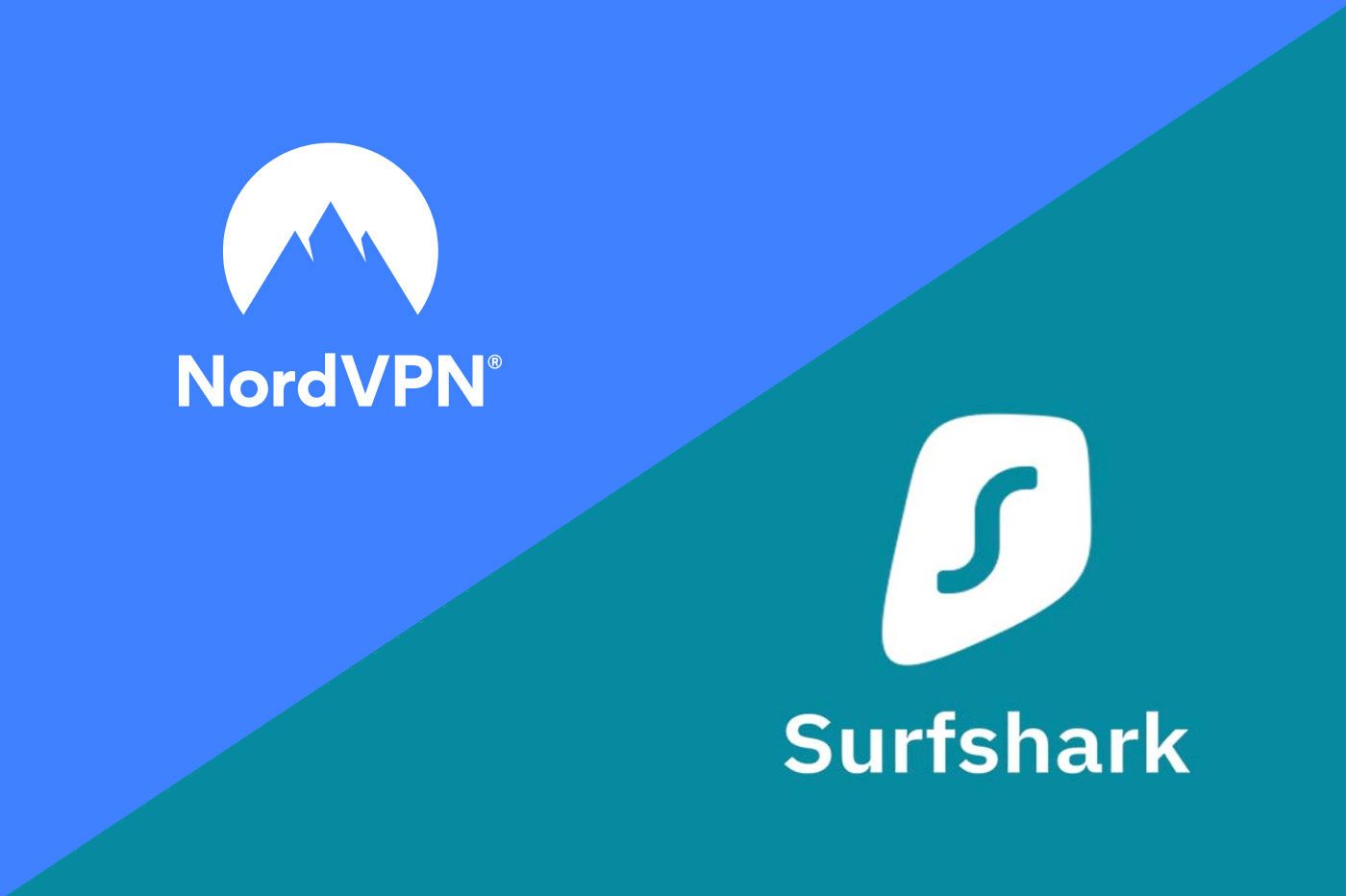
If you want impeccable security and privacy accompanied by solid performance and streaming capabilities, Surfshark and NordVPN might be in your mind. Besides, we’re talking about two affordable VPNs, each of them having great qualities despite the cheap price.
While Surfshark is a much younger provider, NordVPN has been on the market for quite some time and is a more resounding name. That’s not to say that Surfshark is bad. In our Surfshark vs NordVPN comparison, you’ll be surprised at how good this affordable VPN is.
In fact, we’re going to stack these two against each other to see which VPN is a better choice for you. Of course, we’ll compare every aspect of their service in a bid to determine the winner at the end.
Believe me – it’s going to be a tough battle! Yet, only one can emerge victorious from this duel, so let the battle commence, and let’s get to the subject.
7492 servers
118 covered countries
30 days money-back guarantee
10 simultaneous connections
9.8 /10
3000 servers
100 covered countries
30 days money-back guarantee
Unlimited connections
9.1 /10
Surfshark vs NordVPN: Apps & Ease of Use
To initiate my NordVPN vs Surfshark VPN comparison for 2025, I’ll start with the applications and device support. Let’s start with the latter, though. Being two premium providers, you can expect them to support a plethora of devices and platforms.
Since I’ve been using both VPNs for years now, I can tell you that they offer the same level of device support. Of course, this means they can be installed on Windows, macOS, Linux, Android, iOS, and other platforms.
I especially like their support for Android/Smart TV, Firestick TV, gaming consoles, and even routers! This makes it easy to protect all devices connected to a router, extending the number of simultaneous connections you get by default.
Speaking of which, Surfshark has one HUGE advantage over NordVPN in this case. It offers unlimited simultaneous connections, whereas NordVPN gives you just 6. No doubt, Surfshark mows down NordVPN when it comes to simultaneous connections – that’s how it is.
Surfshark
When it comes to the overall user experience, I think that both services deliver effortlessly. Surfshark is perhaps my favorite VPN app for Mac, and Windows… I like how well laid out it is as well as the ability to switch from a dark/light theme, which should give your eyes a bit of rest.
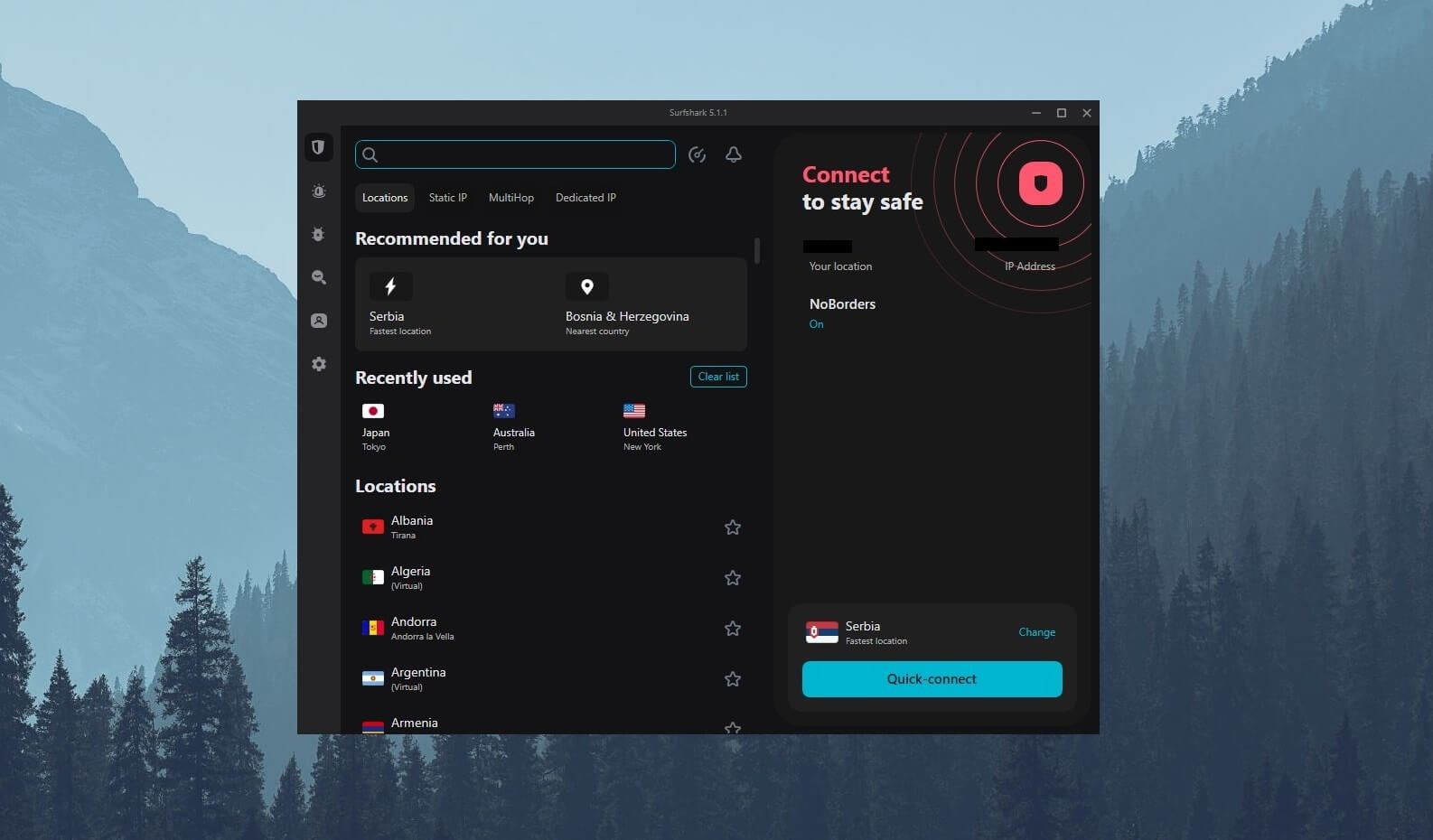
Moreover, its applications are similar across the board, so the mobile and desktop apps share the same principle. On the desktop, you have a server list taking up the majority of the screen, and on the right, you have a connection button that you don’t need to use.
Besides, connecting to a server takes a single mouse click, which is really convenient. On mobile phones, it’s easy as well. You just tap on Locations, the server list opens, and you tap once on the server location you want. That’s all.
One thing where Surfshark did a great job was arranging the Settings menu. NordVPN did this poorly, as I’ll discuss soon, but with Surfshark, all the important features are located in a menu called VPN Settings.
Here, you can find a kill switch, the selection of protocols, and every important security feature. No need to cycle through sub-menus and lose yourself in an onslaught of options and buttons. This, by the way, applies to the mobile version that offers the same user experience.
Overall, I like how well Surfshark looks and works. The server list is comprehensive, the features are clearly displayed, and everything works smoothly. Props to the developers for doing a good job.
NordVPN
Moving on with my Surfshark vs NordVPN comparison, let’s talk about the second service. I also like its modern-looking app, with a beautiful world map and the server list on the left. Much like Surfshark, connecting to a server takes a single mouse click.
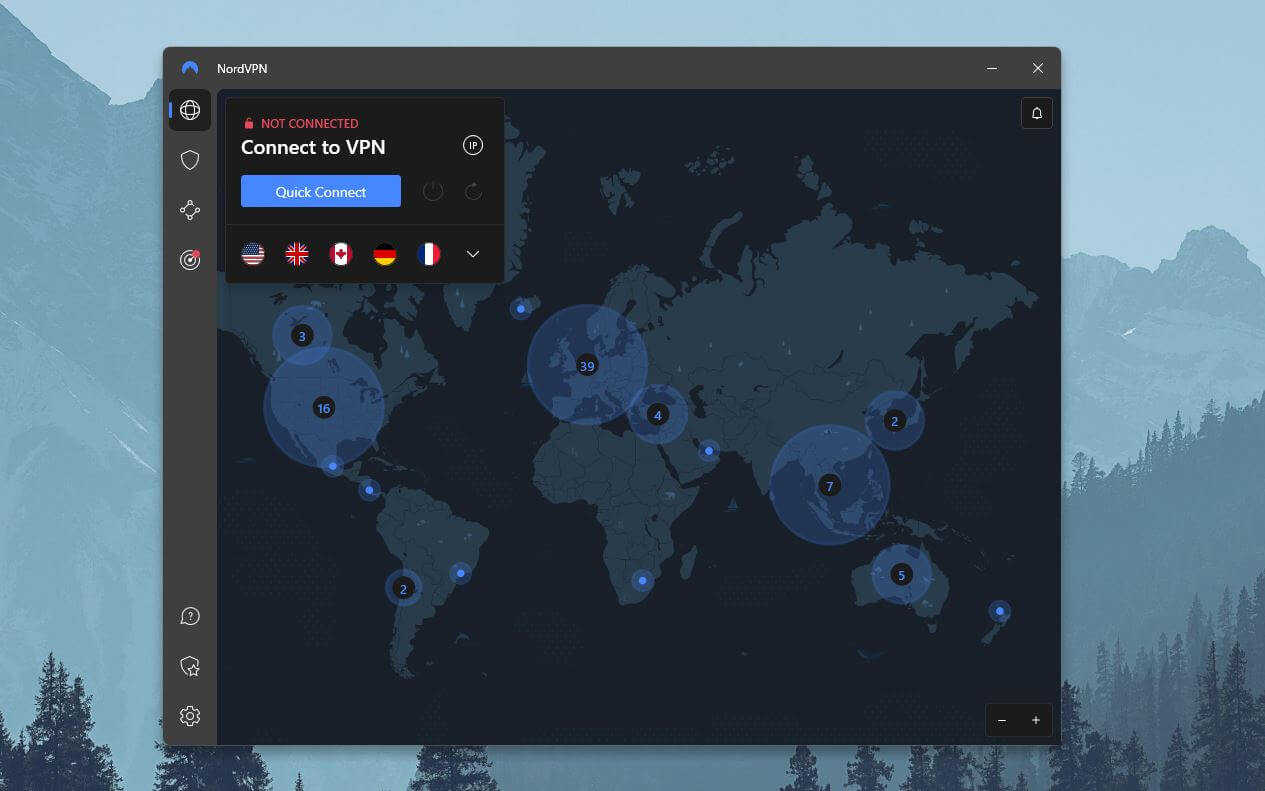
NordVPN’s mobile application is as beautiful. In fact, it is listed in our top 3 best VPNs for iPhone. You also have a world map and opening the server list is done by sliding upwards from the bottom of the screen. Once you do that, simply tap on the server location and the connection will be established.
I like that NordVPN offers a few types of specialty servers on the home screen, too. You can immediately access Double VPN, Onion Over VPN, and P2P servers with a single tap/mouse click, making everything more convenient.
However, this is somewhat ruined by its Settings menu which is feature-rich but a bit cluttered. Every feature has its menu which I like, but then, you have a bit of a confusing layout. The protocol selection is in the Connect menu, just in case you want to change the protocol you’re using.
Also, enabling obfuscated servers wasn’t possible unless you changed your protocol to OpenVPN TCP. That was fixed a year or so ago with the update to the app. Now, you can access obfuscated servers from the home screen and NordVPN will automatically use OpenVPN TCP for you.
Still, if you don’t live in a censored country, most likely, you won’t use these servers. The good thing is that a kill switch and split tunneling have their own menus, and since these are the most used features, you’ll be able to access them easily.
Who Wins?
Overall, I like Surfshark’s applications more, despite NordVPN looking more modern. Plus, Surfshark offers unlimited simultaneous connections, while NordVPN offers just 6. Thus, in the first round of my NordVPN vs Surfshark VPN comparison, Surfshark WINS.
Security & Privacy: Which One Is Safer to Use?
For me, the most important aspect of a VPN is its security (and privacy). My Surfshark vs NordVPN comparison for 2025 will tell you exactly which service is better in this regard. But bear in mind that these are some of the most secure providers, too.
As such, they share some similarities that all VPNs on this level have, with some bonus features unique to both providers. Nonetheless, let’s talk more about these features and see how well these services compare to each other.
Security Features
NordVPN and Surfshark indeed share security features, including 256-bit AES encryption, an automatic kill switch, split tunneling, and an ad-blocker. In NordVPN, this ad-blocker is called CyberSec and in Surfshark, it has a fancy name – CleanWeb.
It’s important to mention that both VPNs support OpenVPN, and while Surfshark has WireGuard, NordVPN offers NordLynx. This is a proprietary protocol based on WireGuard, but it’s much improved over its vanilla version.
Therefore, NordLynx is a better protocol overall. One thing to mention is that they both have IP and DNS leak protection as well as means for bypassing censorship. NordVPN has obfuscated servers while Surfshark offers a NoBorders mode.
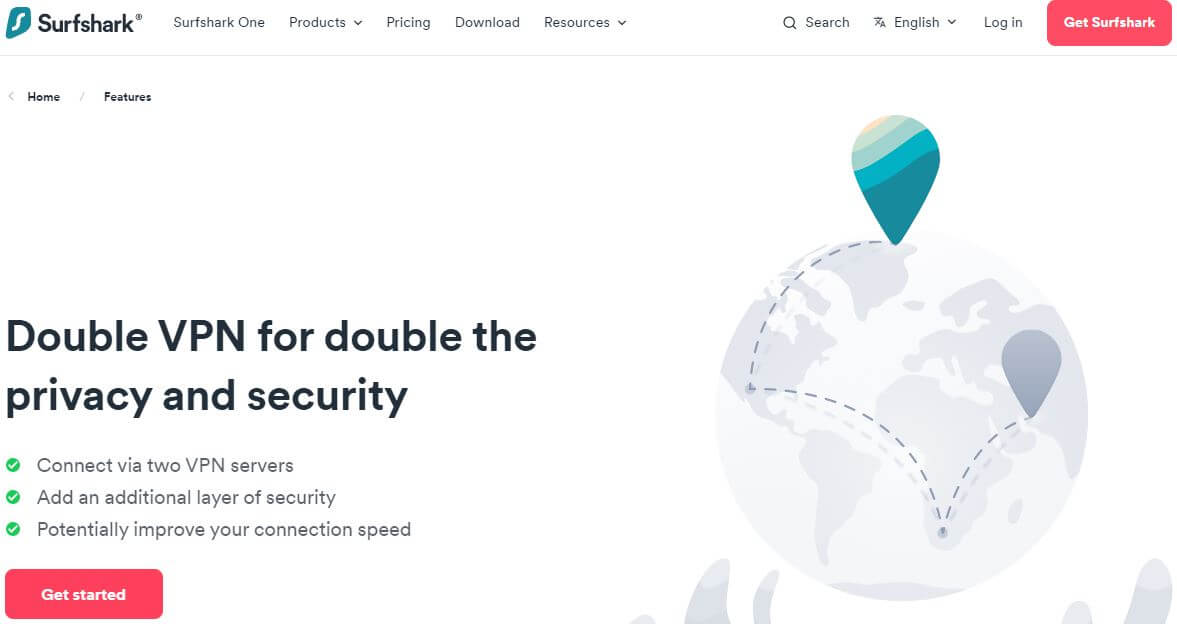
Then, we come to Double VPN and MultiHop – these are the same features. They route your traffic through two servers, doubling your encryption in the process. Both providers have ample features, one of which is antivirus. Yes, NordVPN has it in every plan, while Surfshark requires you to pay a bit more.
On the other hand, both services seem to offer RAM-only servers. This type of server is excellent for privacy, as the server loses data with each restart, which makes your private information safer. Also, Private DNS is another worthy feature we didn’t mention.
When a VPN has Private DNS, it means it uses in-house DNS servers for handling your DNS requests. A bonus feature that we’ll address later is the option to delete your data from companies’ databases. NordVPN calls it Incogni. It’s a bonus feature available in both services.
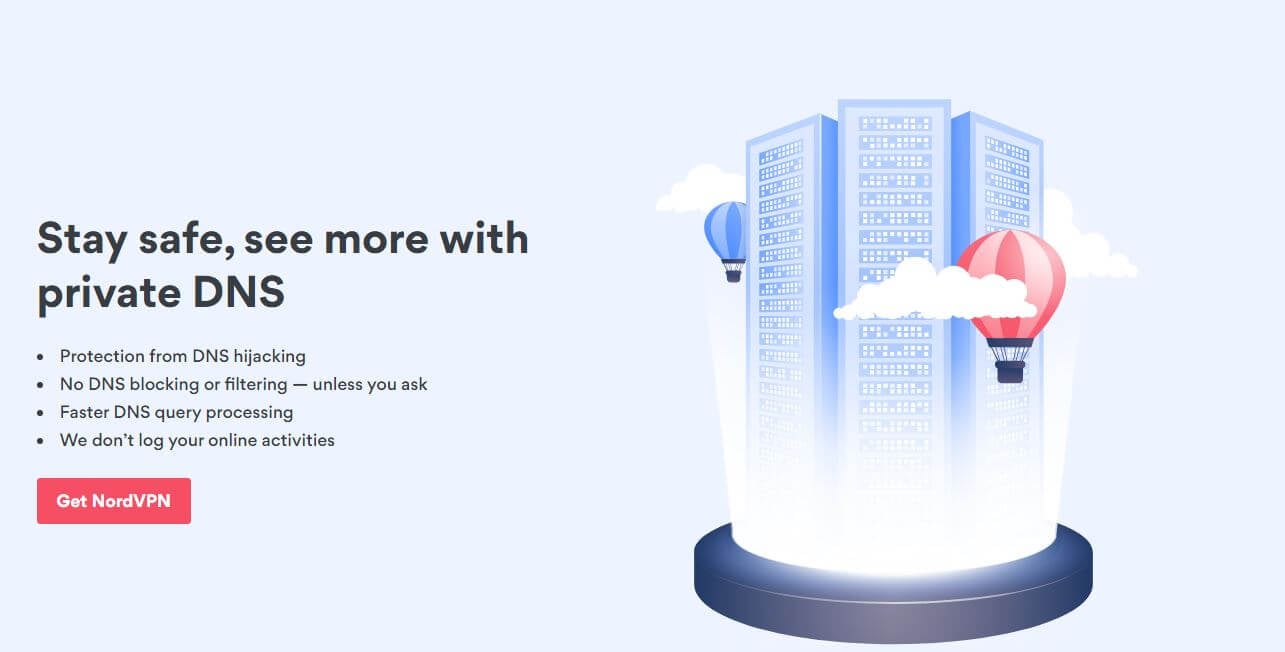
If you pay a top dollar, you can get your data wiped from companies’ databases and have a clean slate. Dedicated IPs are here in both services too but Surfshark offers Static IPs to strike back against its rival. We can see that these VPNs are very similar – probably because they now work together.
Believe it or not, there is one more similarity. NordVPN offers Dark Web Monitor which is Alerts in Surfshark. This feature is email monitoring and it informs you of security breaches. If your email is compromised, you’ll get a notification, allowing you to take action.
What Are the Differences?
In this Surfshark vs NordVPN duel, I mentioned that these providers are similar. However, there are some differences in how they work as well as their bonus security features. The most noticeable difference will be a kill switch.
Surfshark offers a simple kill switch that disables internet access upon losing a VPN connection. Its competitor does the same but it has one annoying characteristic. Namely, if you enable it, it won’t allow you to connect to the internet if you’re not connected to a VPN server.
It can, therefore, create an issue that seems complicated but it isn’t. All you need to do is disable the kill switch and all issues will be gone. However, NordVPN also offers the app kill switch which works the same but on the app level only – Surfshark VPN doesn’t have this.
We already mentioned their bonus features in this NordVPN vs Surfshark duel. However, NordVPN has a plethora of bonus features that you don’t need to pay for separately. They’re included in the app free of charge. Unfortunately, Surfshark will charge you more for them, which is a big difference.
For example, while both VPNs offer an ad blocker, NordVPN has this Threat Protection bundle. It packs CyberSec, malware protection, and antivirus, allowing for 360-degree protection against online threats. To get antivirus in Surfshark, you’ll have to get the One plan at least.
Another perk of NordVPN is Meshnet. This feature is remarkable in terms of what it can do. Meshnet allows for remote control, hosting LAN parties, sharing files securely, and even taking an IP address of another device to go online. Most amazingly, you can connect up to SIXTY devices!!!
Is There a No-Logs Policy?
At the start of my NordVPN vs Surfshark comparison, I mentioned that these are some of the most secure VPNs. This means that they store no logs, which should be the case if you’re already paying for a subscription.
Additionally, both providers are based in privacy-friendly jurisdictions. Surfshark is in the Netherlands, while NordVPN’s jurisdiction is Panama.
In recent times, many VPNs started getting third-party audits on their policies to boost their credibility. As such, NordVPN got its audit from PriceWaterhouseCoopers and Deloitte – 3 audits in total. Surfshark went to Cure53 and Deloitte as well to get the same treatment.
It’s clear that both VPNs have no-logs policies, but let’s examine them deeply and see what they store or don’t store.
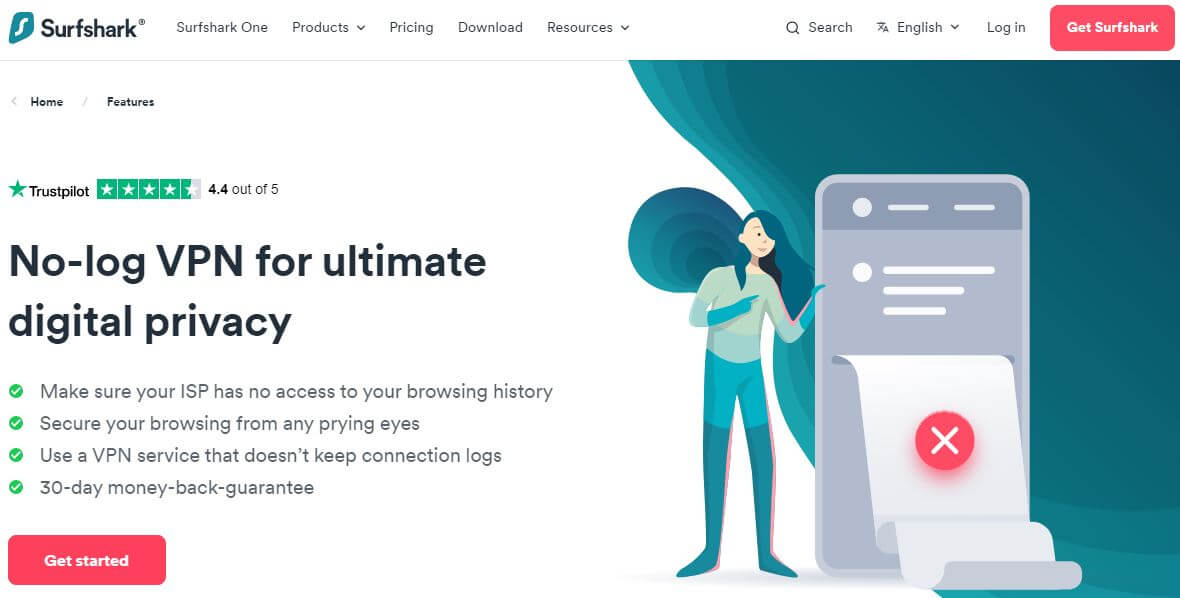
Surfshark’s no-logs policy is pretty clear. It won’t store info on your IP address, browsing history, session information, used bandwidth, connection timestamps, and network traffic. This means that it can’t track your browsing activities or determine your location.
Of course, some information is required to keep your subscription active, but in this case, it’s benign. The company stores your email address and billing information, as well as crash reports, unsuccessful connection attempts, and anonymous performance data.
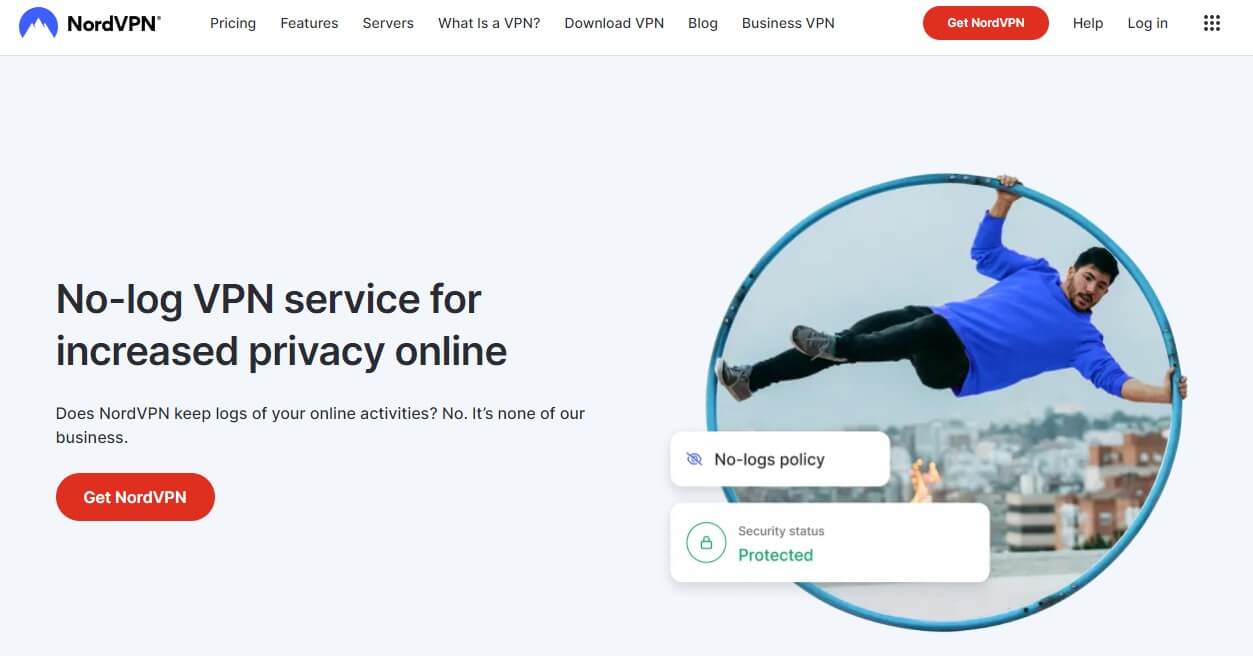
NordVPN follows in the same footsteps. It doesn’t store connection duration and date, IP addresses, VPN servers you’re using, websites you visited, DNS queries, and other similar bits of information.
The information that NordVPN stores is similar to Surfshark. They include your email, payment data, country details for VAT calculation, anonymous crash reports, and similar information. None of the collected information can be used to track any user, and that’s what’s important.
NordVPN’s 2018 Security Breach
I want to quickly reflect on NordVPN’s security breach in 2018. One of its servers in Finland was a victim of a hacker attack, which, fortunately, did not affect the service, thanks to the quick intervention of the company’s teams.
Luckily, no damage was done to the server and hackers couldn’t extract any user information, so they didn’t compromise anyone’s privacy. Besides, NordVPN stores no logs on its servers, and this was proof that this was indeed the case.
It’s worth noting that the provider admitted this right away and remained honest with its user base. This proves its transparency and the focus on staying in good relations with the users. Since then, nothing similar happened to NordVPN, which removes the need for worries.
The provider is significantly better than it was in 2018, so I’m sure its rock-solid security will prevent even the most skilled hackers from doing damage.
Who Wins?
The security part of our NordVPN vs Surfshark comparison is pretty tough. Both VPNs displayed an exceptional level of security and given that both have certified no-logs policies, we call this round a DRAW.
Surfshark vs NordVPN Streaming Test
If you’re using a Virtual Private Network mainly for streaming, will NordVPN and Surfshark be sufficient? Well, in this part of my Surfshark vs NordVPN comparison, I will answer this question by testing them out on several streaming services.
Netflix Test
Of course, the most important test is the one on Netflix. As you know, this platform bases its catalogs according to your location. For that reason, people use a VPN on Netflix to unblock movies and shows available in different countries.
Right now, the best Netflix libraries are the ones in the US, Canada, and Japan – the same libraries we’ll test in today’s comparison. Before I show you the results, I’ll reveal that both VPNs worked really well, and managed to unblock all of them.
Surfshark
- Netflix US (Grey’s Anatomy): OK
- Netflix Canada (Midnight in the Switchgrass, only on Netflix CA): OK
- Netflix Japan (Naruto Shippuden): OK
NordVPN
- Netflix US: OK
- Netflix Canada: OK
- Netflix Japan: OK
Other Streaming Platforms
Apart from Netflix, other quality streaming platforms offer a different experience. Some of them include BBC iPlayer, Hulu, and Hotstar, which are going to be the main candidates for today’s testing.
BBC iPlayer is based in the UK, so to unblock it abroad, you need a British IP address. I obtained it from the two VPNs and when I tested the platform, it worked well in both cases.
Hulu is a well-known US streaming service and here, the same logic applies. With a US IP from both providers, I managed to make it work flawlessly. It is anything but a coincidence that many people consider them to be good VPNs for Hulu.
And finally, I wanted to include Hotstar in this Surfshark vs NordVPN duel. To unblock it, I used an Indian IP because the platform works only in India. Needless to say, my attempts with both VPNs were highly successful.
Who Wins?
As you saw, the two VPNs displayed exceptional streaming capabilities by unblocking all Netflix libraries and streaming platforms. With that in mind, the result of this test is a DRAW.
NordVPN vs Surfshark Speed Comparison
Right when we talk about streaming, I think it’s time to see how fast both VPNs are. After all, streaming is also about the VPN’s speed because it determines whether or not you’ll be able to enjoy watching content without buffering.
So how did I do my speed tests? For the start, you need to know that I tested both services for 3 days, 3 times a day, and I used 4 very different server locations. They include the UK, the US, Japan, and Australia.
Bear in mind that I’m located in Eastern Europe, so I tried to cover not only Europe but other continents as well. Additionally, my native speeds without using a VPN look like this:
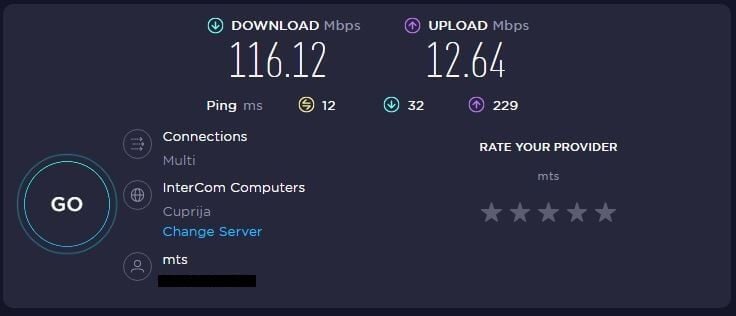
And with all the tests I’ve done, I’ve compiled the best possible results I got from both VPNs, so let’s take a look and analyze them:
Surfshark
US:
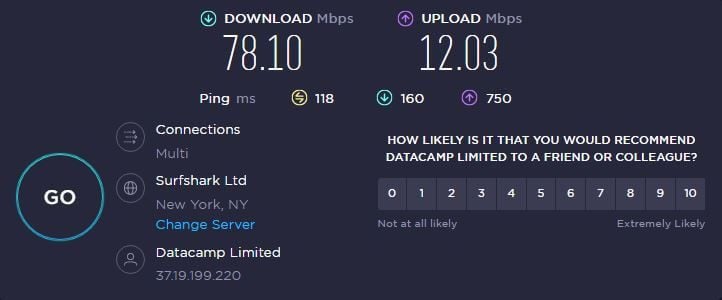
UK:
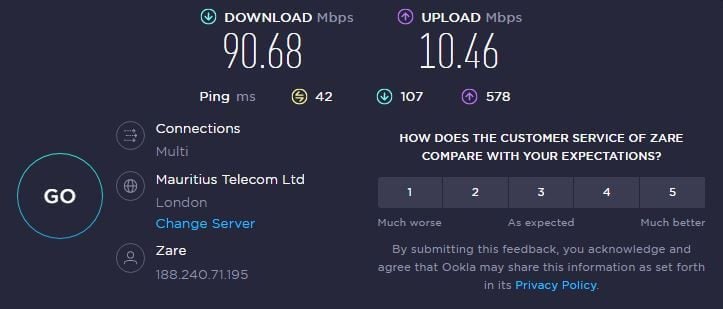
Japan:
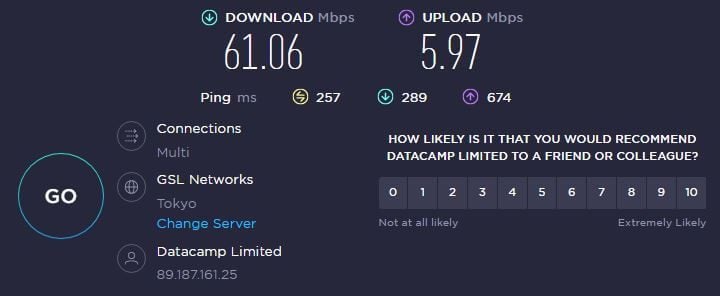
Australia:
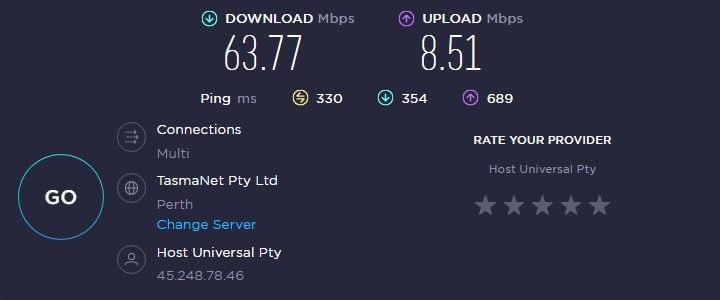
NordVPN
US:
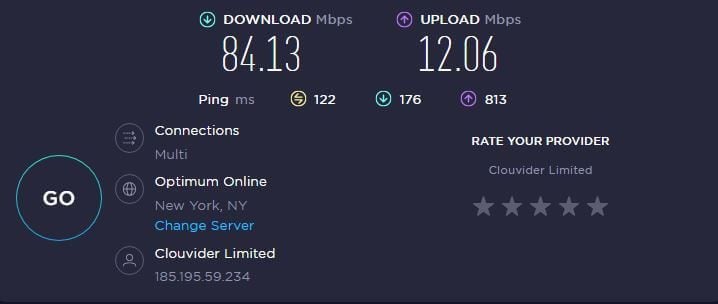
UK:
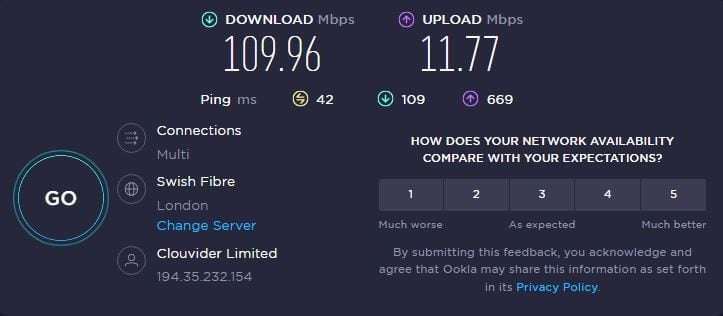
Japan:
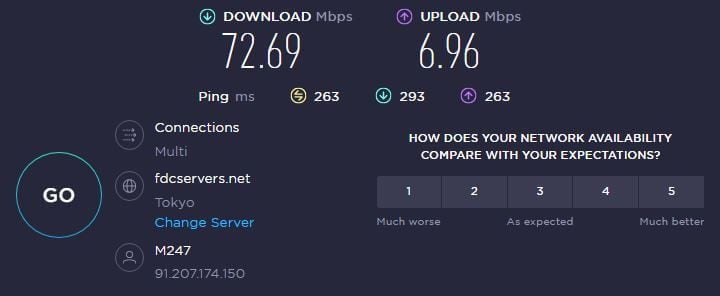
Australia:
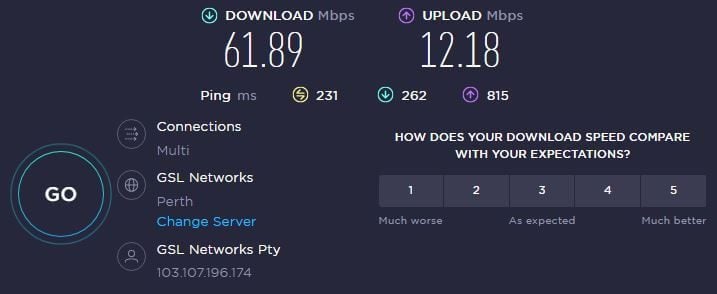
Who Wins?
It’s easy to see that Surfshark VPN’s performance is average compared to NordVPN that’s much faster overall. This applies especially to long-distance servers where NordVPN clearly dominates Surfshark by a noticeable margin.
A large difference in performance means only one thing. And that is why NordVPN WINS this part of the comparison.
Torrenting: Are Surfshark and NordVPN P2P-Friendly?
Whenever you’re torrenting or using P2P sites like Popcorn Time, using a VPN is mandatory. First, a VPN will make sure you enjoy anonymous torrenting, and second, it’ll make sure you stay safe on malware-riddled torrent websites.
In my NordVPN vs Surfshark VPN duel, I tested both VPNs in this regard, only to come out with great results. However, bear in mind that the first one mentioned has special P2P servers in the app as well, so you can use them to download torrents with the best possible performance.
These servers are optimized for this activity and they are a pretty large part of NordVPN’s server fleet. On the other side, we have Surfshark which doesn’t have P2P servers. Instead, its entire network is P2P-friendly, so all 3,200+ servers can be utilized for this activity.
However, given Surfshark’s slower speeds, I recommend using either a server in your country or the one in the country next to you to maximize performance. NordVPN offers much better speeds, so even if you go a bit farther, you won’t notice big speed reductions.
Nevertheless, I tested both VPNs and I tried downloading Linux using qBitTorrent.
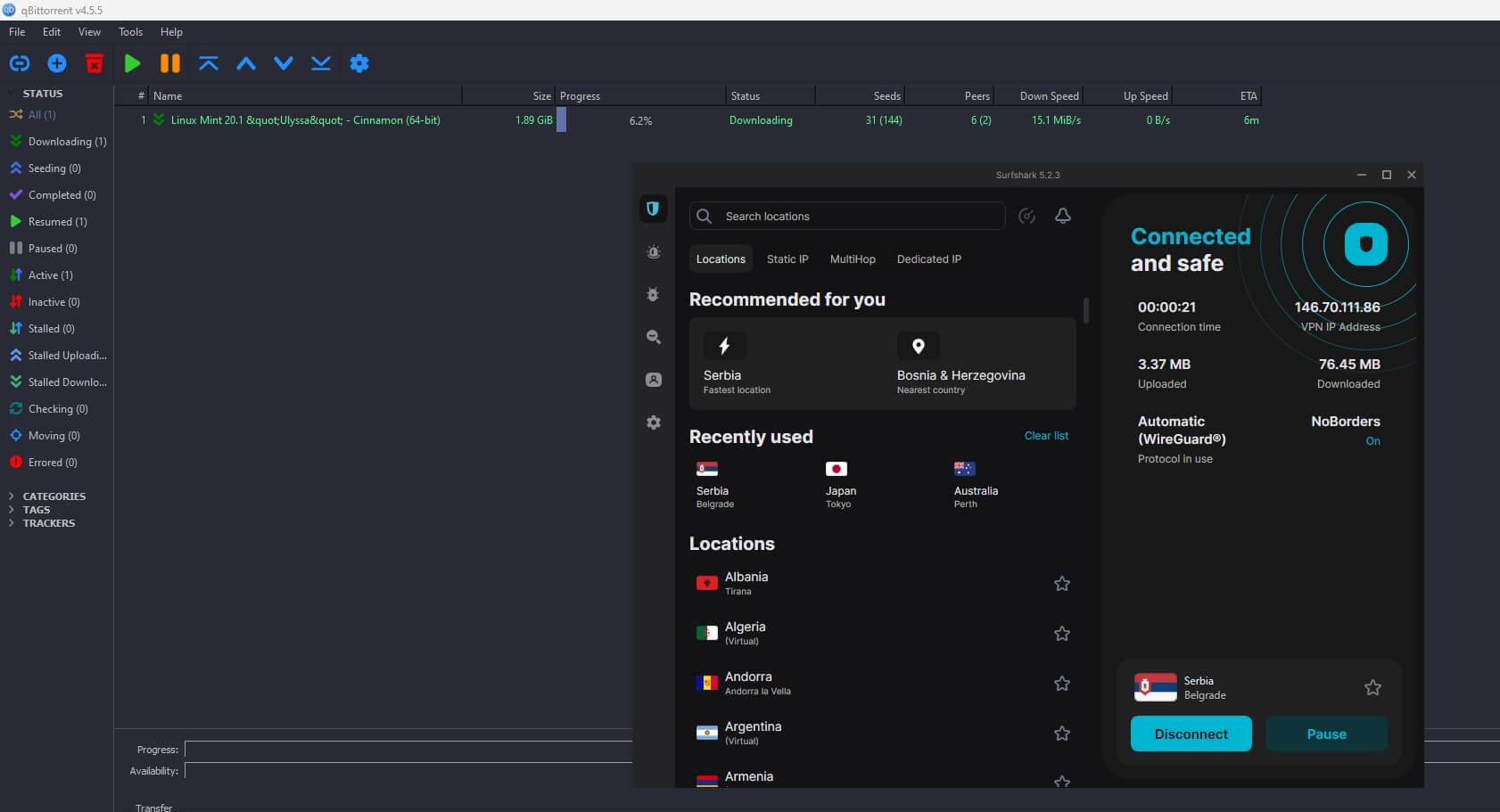
As you can see in the screenshots, torrenting worked without any issues with both VPNs.
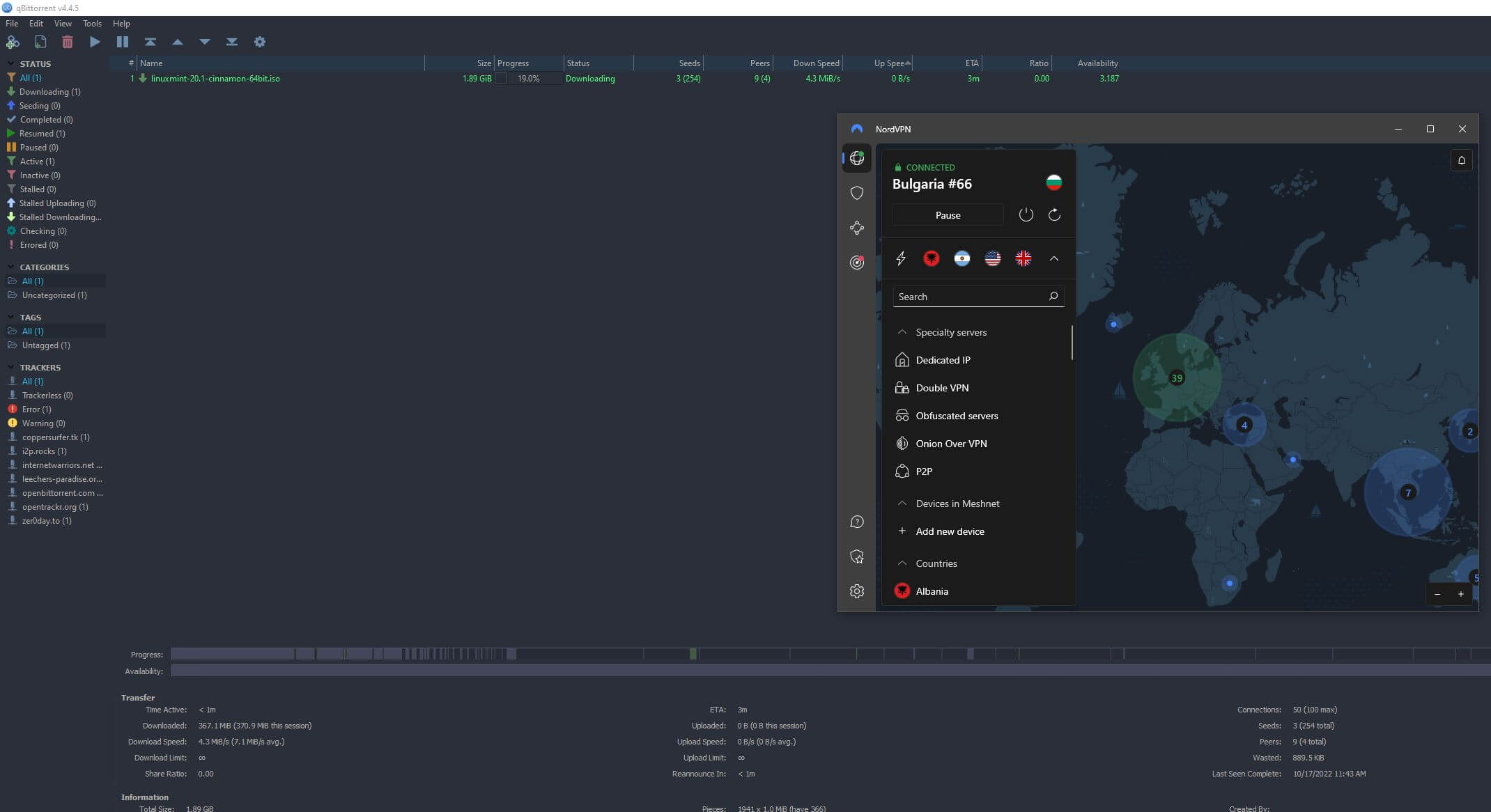
Who Wins?
This part of my Surfshark VPN vs NordVPN duel saw both VPNs perform well in terms of torrenting. While both of them are P2P-friendly, NordVPN offers better torrenting performance overall, so it WINS this round because of that.
Are NordVPN and Surfshark Working in China?
Bypassing censorship in China is a brutal challenge even for the best VPNs out there. NordVPN and Surfshark are one of these and they’re often regarded as decent VPNs in China. For those who don’t know, The Great Firewall is the main issue in China.
It’s a firewall that blocks more than 8,000 sites, along with VPN providers, resulting in a censored and pretty limited internet experience. Some VPNs slip through the cracks but most of the time, they fail to provide a decent experience in China.
To put both providers to the test, we gave our subscriptions to our acquaintances in China. And as expected, they managed to use both of them with no issues but with a few tweaks. When using Surfshark, they enabled the NoBorders mode.
Without it, the VPN, in most cases, won’t work properly. To utilize NordVPN, they needed to enable obfuscated servers and connect to one of them. In this case, it worked flawlessly and with no disconnects.
Bear in mind that NoBorders and obfuscated servers tend to slow down the speeds a bit. Also, our colleagues reported that NoBorders is a bit less reliable than NordVPN’s obfuscated servers.
Sometimes, Surfshark failed to work even with the option enabled (more details in our Surfshark review), while NordVPN has been more consistent in each consecutive attempt with its obfuscated servers. Although they both work in the country, NordVPN is, after all, a bit more dependable.
Who Wins?
Knowing that both VPNs work in China is great news. But, with NordVPN being more reliable with its obfuscated servers, it WINS this round of comparison by a tiny margin.
NordVPN vs Surfshark Server Fleets: Which One Is Bigger?
Those who know a thing or two about Surfshark know that it isn’t known for a large server network. However, in 2025, things changed a bit and the service is now ready to compete with the big boys.
NordVPN (5,600+ servers in 60+ countries)
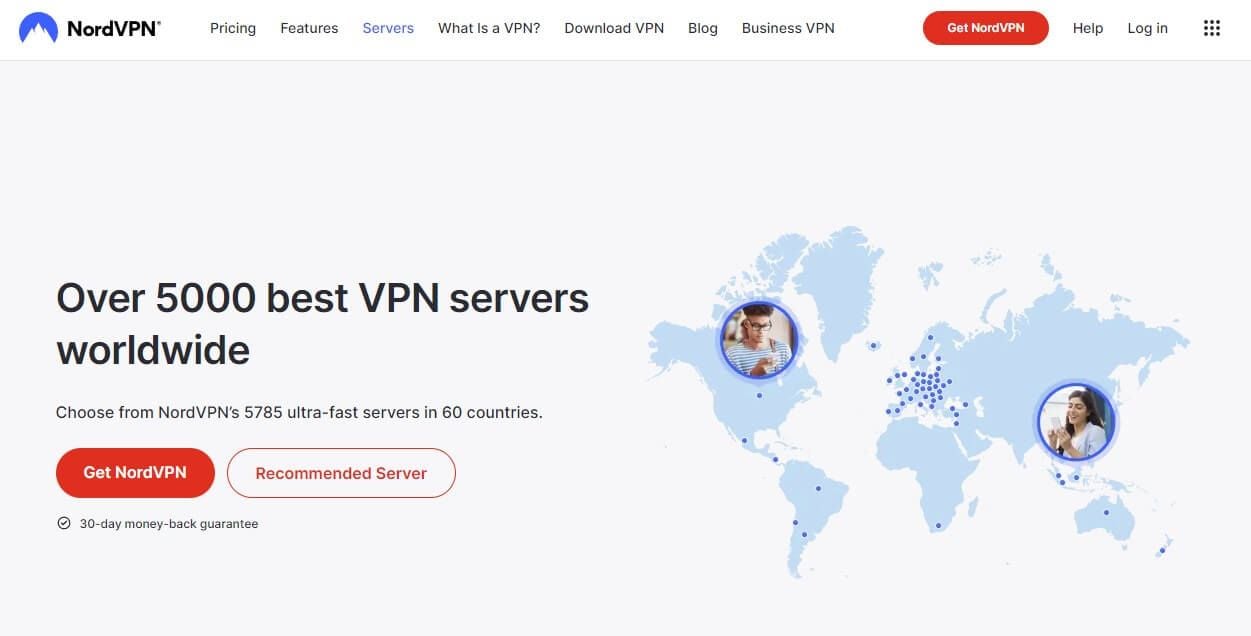
One of these big boys is NordVPN. It offers 5,600+ servers in more than 60 countries, and you’ll agree that these numbers are impressive. The good thing about the service is its server variety, which the company pushed to the fullest.
P2P servers are here for torrenting, onion over VPN servers let you browse the dark web safely, and Double VPN servers will double your encryption by routing your connection through two servers.
Don’t forget obfuscated servers for bypassing censorship that so far, proved to be very resourceful and dependable. What’s more, the server distribution is more than decent. It mostly covers the US and Europe but Asia, Africa, and Australia are on the list, too.
I especially like its servers in Japan, the UAE, Turkey, and Eastern European countries. As for the servers in the US, it has nearly 2,000 in this country alone, in 15 different cities. All of this makes its server fleet extremely large and always uncrowded. As such, it offers maximum performance at any given moment.
Surfshark (3,200+ servers in 100 countries)
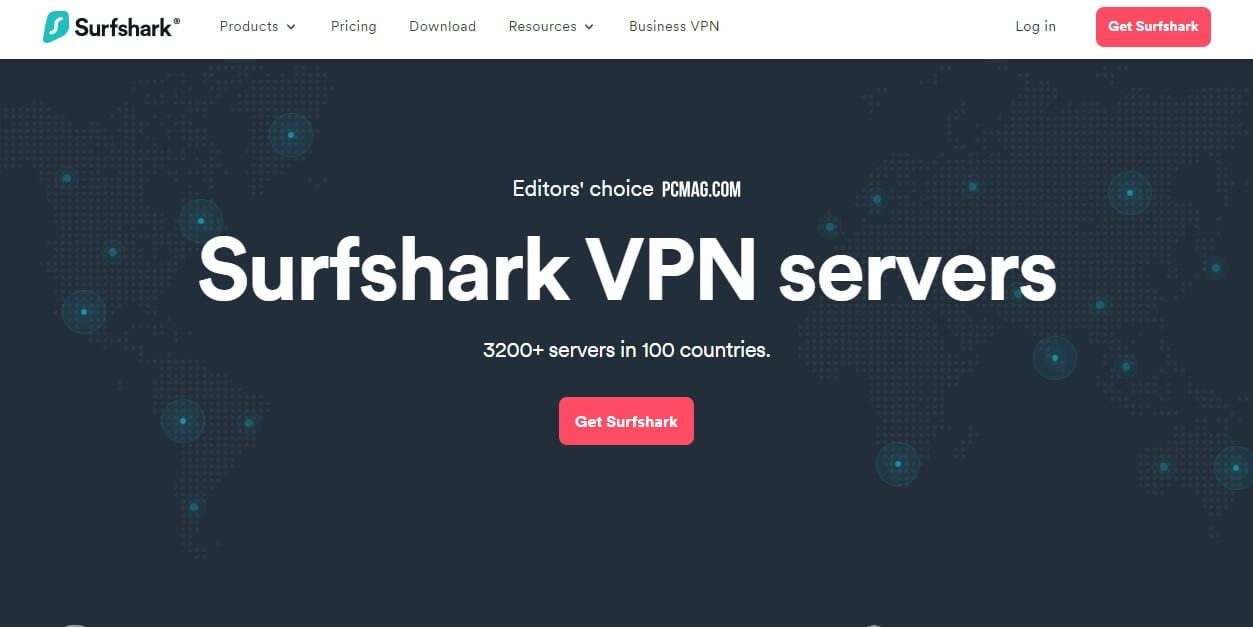
Surfshark offers servers in 100 countries, which is marginally larger than NordVPN. However, it has 3,200 servers, which is a much smaller number. Additionally, its server variety is great, as you get MultiHop servers, Static IP, and Dedicated IP options.
MultiHop is another name for Double VPN, so you can expect the same functionality – routing your traffic through two servers for double encryption. Surfshark’s server distribution is decent, too, with servers mostly in Europe and the US.
Some of these servers are virtual and they’re in countries like Argentina, Belize, Cambodia, Ecuador, and many more. Interestingly, Surfshark offers more than 25 locations in the US and 4 locations in the UK, so you can find a lot of servers in these regions.
In Europe, you’re mostly looking at country-level servers, except for Germany, Italy, and France, where you can find two or three server locations. Thanks to servers in 100 countries, Surfshark is never overcrowded, so you can get decent performance out of it as well.
Who Wins?
However, given that NordVPN has 40 countries less but 2,400 servers more, plus a much better server variety, we can conclude that NordVPN WINS this round.
Customer Support of NordVPN & Surfshark: How to Contact Them?
NordVPN and Surfshark can take pride in having responsive and helpful customer support. In my comparison of the two giants, I had no issues getting my questions answered as they both have 24/7 live chat support.
This means that you’ll usually get a response in less than 10 seconds, which is pretty fast considering that lots of users are interacting with the support team. Similarly, both VPNs offer email support as well if you don’t feel like chatting.
However, I’m always surprised at how fast it is. Upon sending an email, these providers will usually come back after 15 to 20 minutes, and sometimes less. This is very fast considering that email support is usually characterized by everything but haste.
Of course, when we talk about customer support, it’s vital to mention other means of support. NordVPN and Surfshark offer YouTube channels, as well as on-site FAQs, a Knowledge Base, and numerous guides and tutorials.
With this in place, you can comfortably fix your VPN-related issues without contacting customer support. But if a serious problem arises, you at least know that they have your back 24/7, so you can make everything work in no time.
Who Wins?
During my NordVPN vs Surfshark comparison, I found both customer support to be satisfactory, helpful, and always available. For that reason, this round is yet another DRAW.
Pricing Comparison: How Cheap NordVPN & Surfshark Are?
In the end, let’s talk about the pricing of these VPNs and see if they’re affordable. As said at the start, NordVPN and Surfshark won’t cost you a fortune.
NordVPN
However, let me start with NordVPN and its pricing structure. Speaking of pricing structures, it’s worth noting that both providers have plenty of plans. Both offer 2-year, 1-year, and monthly variants with 3 plans each. Therefore, we’ll go through 9 plans for each provider.
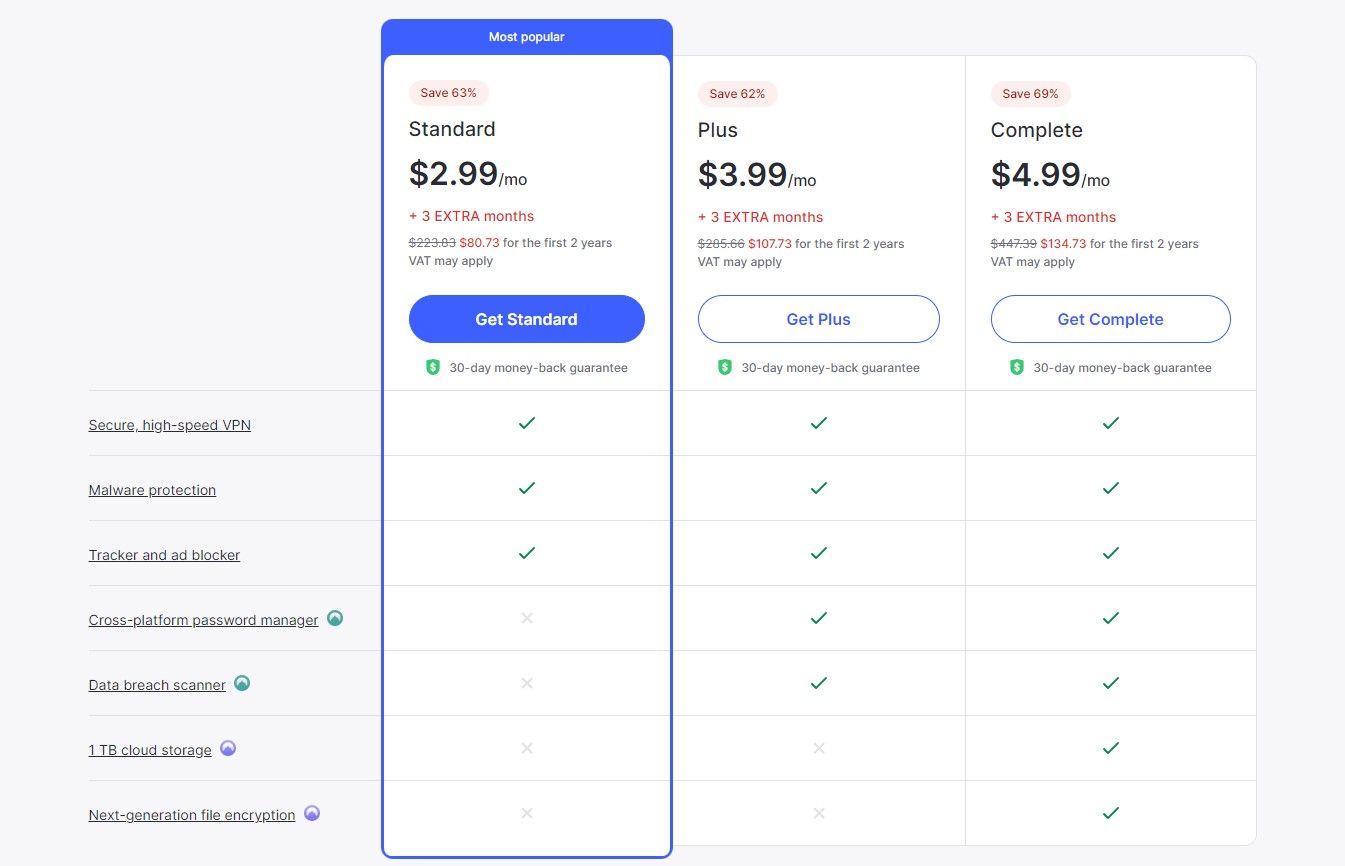
As you can see, its cheapest 2-year plan (+3 months free) will cost you under $3 a month and this is a Standard plan. Does this mean you’ll get fewer features? No – you just won’t get NordPass and NordLocker. Compared to ExpressVPN, for example, it is a lot cheaper.
As mentioned in the full NordVPN review, keep in mind that it has value-added taxes that apply to certain countries. Thus, if you live in the US, the UK, or some EU countries, you can expect these taxes to be included, increasing the price a bit. Even in this case, the provider will be affordable but not more than Surfshark.
If we look at the Plus and Complete plans, they’re also inexpensive for what you get. The Plus plan comes with NordPass, while the Complete plan gives you this password manager PLUS NordLocker, a cloud storage service with 1 TB of storage. Quite a nice addition.
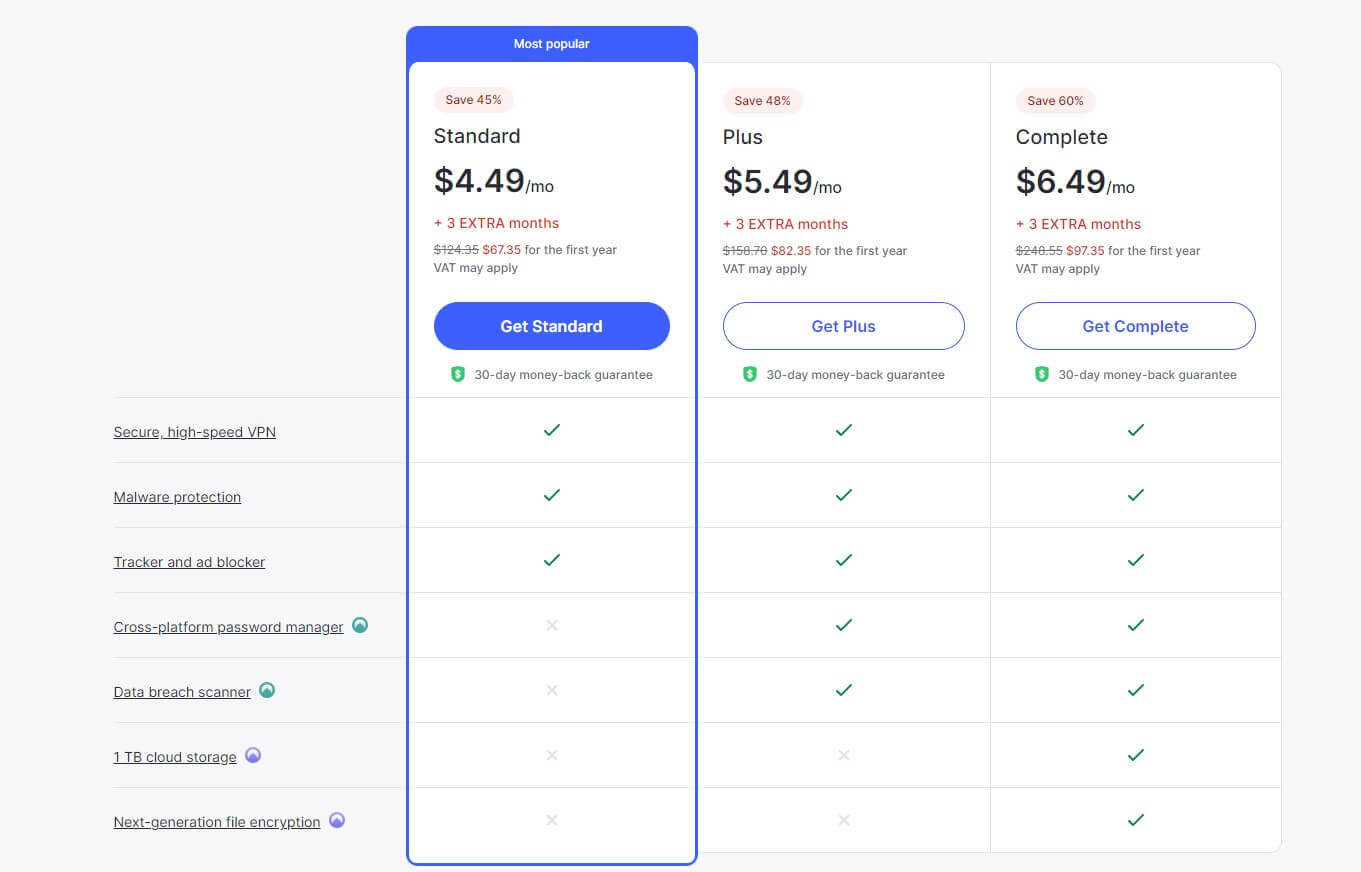
What about its annual plans? Here you go – again, you’re getting 3 free months for each but this time, the prices are a bit higher. The Standard plan is now under $4.5 a month, while the complete plan stands at under $6.5. You’ll agree it’s a lot more expensive but still not on the level of Astrill VPN.
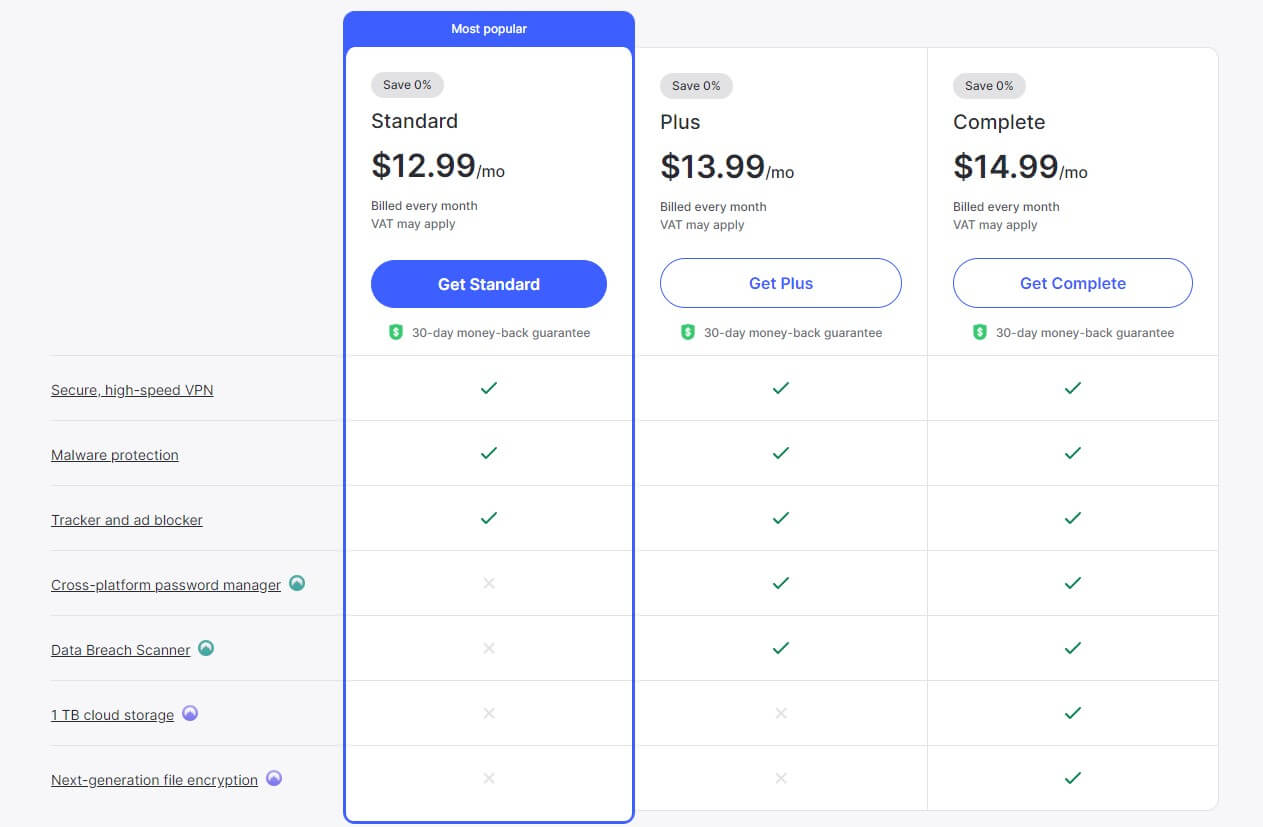
Lastly, NordVPN’s monthly plans are a lot more expensive and we won’t delve too deep into them. As you can see, they go from around $13 to $15.
Surfshark
In this NordVPN vs Surfshark comparison, we’ll now compare the latter’s subscription plans.
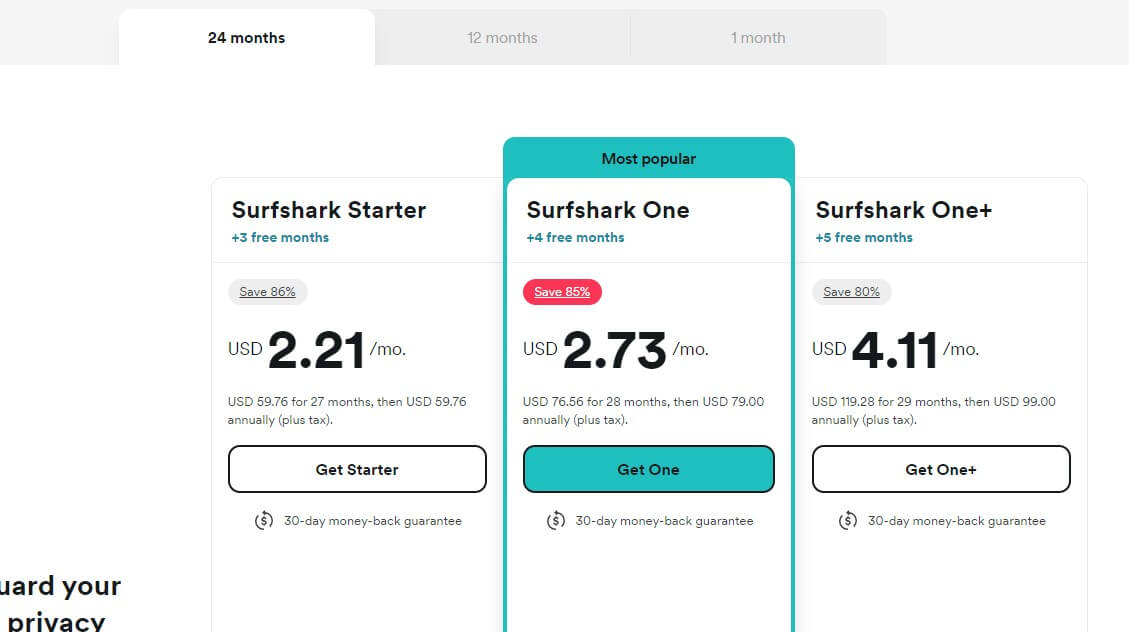
Surfshark will cost you $2.21 a month for the plan which is now called Surfshark Starter, so you pay just under $60 upfront. The Surfshark One plan with the aforementioned bonus features is under $2.8 a month, which is a lot less than Surfshark One+ at above $4.1 a month.
In this setup, the Dutch VPN is significantly more affordable. Don’t forget that Surfshark One+ has ALL features, including the option to delete your data from third-party companies’ databases, alas, it doesn’t include NordPass and NordLocker – logically.
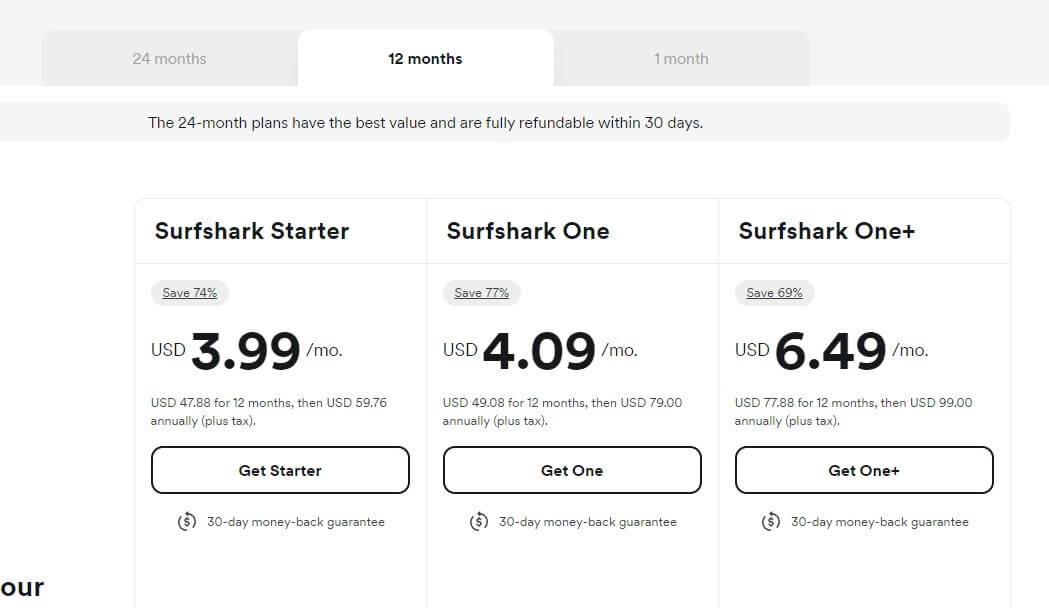
Its 12-month plans tell a different story with higher prices. Interestingly, Surfshark One+ now costs the same as NordVPN’s Complete plan. However, the first two plans are still inexpensive compared to the VPN’s rival. Where Surfshark disappointed us is the monthly plan array – look at it.
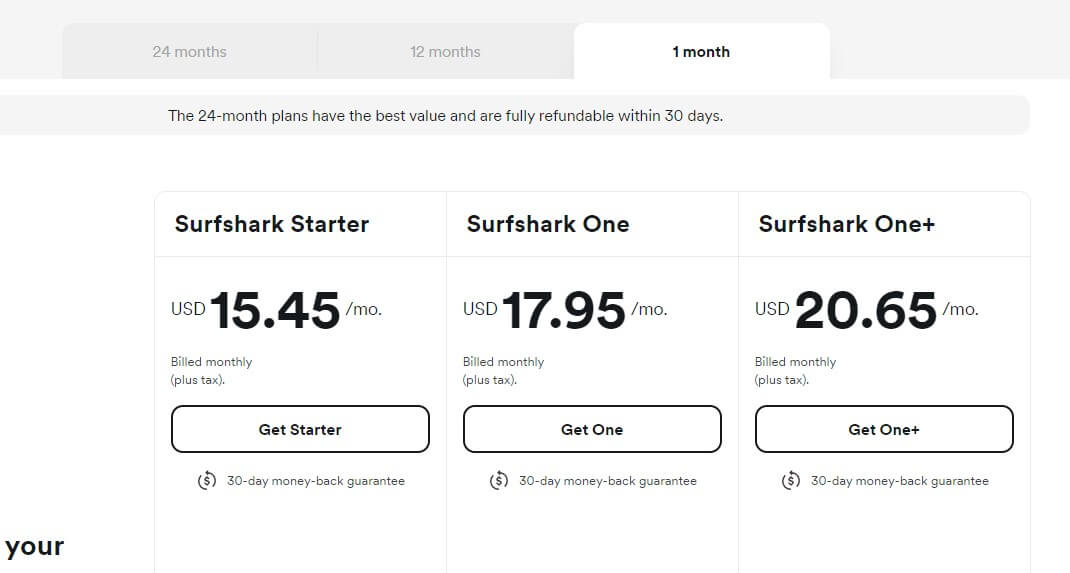
It’s EXTREMELY expensive and starts at above $15.4 a month. The Surfshark One+ plan paid monthly is a whopping $20.65 at the time of writing. Crazy how expensive this cheap VPN could become.
The silver lining is that both services come with an unconditional 30-day refund policy on all plans. Therefore, you can always refill your pockets by requesting a refund, which you will get for any reason. If you don’t like the VPN or you have any technical difficulties – doesn’t matter – a refund awaits you.
Who Wins?
So after this comparison, you can see that Surfshark WINS in terms of pricing. Not only is it much cheaper but it also offers more payment methods and doesn’t have value-added taxes that increase its price. This makes Surfshark a much more suitable option for users on a limited budget.
Conclusion: NordVPN Wins!
Bringing our NordVPN vs Surfshark comparison to the end, we can see that NordVPN scored 7, against Surfshark which scored 5 points. With the result of 7:5 for NordVPN, we can say that this VPN brought home a somewhat strong win.
NordVPN wins against Surfshark in terms of performance, bypassing censorship, the server fleet, and overall torrenting performance. On the other hand, Surfshark has unlimited simultaneous connections, cheaper prices, and servers in 100 countries.
All of this makes the two providers very similar, with only a few tiny differences that set them apart. Besides, NordVPN works closely with Surfshark, so we’re talking basically about the same company that publicly announced its partnership in 2025.
Which one should you choose, though? Well, if your budget isn’t very limited, NordVPN is a better option overall. But if you cling to every dollar and don’t want to spend a bit more on a VPN, Surfshark will be a very close substitute to NordVPN. For this amount of money, it’s impossible to get a better choice than Surfshark, except if we’re talking about CyberGhost.